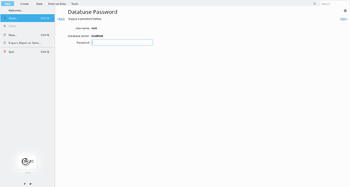Kexi: Difference between revisions
Appearance
m try to recreate unit to avoid problems with TM |
Marked this version for translation |
||
| Line 45: | Line 45: | ||
== Documentation, Tutorials and Samples == <!--T:6--> | == Documentation, Tutorials and Samples == <!--T:6--> | ||
<!--T:13--> | |||
* [[Special:myLanguage/Kexi/Tutorials|Tutorials]] | * [[Special:myLanguage/Kexi/Tutorials|Tutorials]] | ||
* Documentation | * Documentation | ||
Revision as of 08:30, 14 September 2012
 |
Rapid Application Development, for handling your database needs |
Kexi is a visual database creator, part of the Calligra Suite. It can be used for designing database applications, inserting and editing data, performing queries, and processing data. Forms can be created to provide a custom interface to your data. All database objects – tables, queries, forms, reports – are stored in the database, making it easy to share data and design.
Features
- Full visual designers for tables, queries, forms and reports
- Running queries, support for parametrized queries
- Supports SQLite, MySQL, PostgreSQL and MS SQL Server databases
- The only multiplatform graphical tool importing data from MS Access databases
- Supports query design in dedicated SQL view
- Designing and displaying relational data using combo boxes (lookup columns)
- Direct data entry or import using CSV format
- Locked down User Mode, allowing you to switch off all commands related to editing your project's design
- Scripting using JavaScript, Python or Ruby programming languages (experimental)
- Many more features
Read more and see many more screenshots on the project's pages.
 |
 |
 |
Documentation, Tutorials and Samples
- Tutorials
- Documentation
- The Kexi Handbook for Kexi 2.4
- This Handbook is also found on docs.kde.org.
Kexi Cheat Sheet(planned)- Note: scripting is undocumented and experimental, please read [1] for more information
- Samples
- Simple database (kde-files.org)
- Data importing using Javascript (kde-files.org)
- Follow the project on Twitter, facebook or identi.ca.

